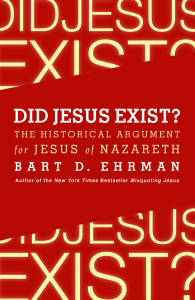 In the last week of my recent Introduction to Philosophy class, two teams of students debated the existence of God in front of the class. After the debate the rest of the students wrote a short response to the debate. While the pro-God side had offered versions of the design and ontological arguments, one student opined in his written response that they had overlooked the obvious. Here is what he wrote:
In the last week of my recent Introduction to Philosophy class, two teams of students debated the existence of God in front of the class. After the debate the rest of the students wrote a short response to the debate. While the pro-God side had offered versions of the design and ontological arguments, one student opined in his written response that they had overlooked the obvious. Here is what he wrote:
God (Jesus) is real, there is documented history of him. I don’t know how someone could deny documented reads.
This suggests the following argument for God’s existence, an argument which has not heretofore been discussed by philosophers of religion:
- Jesus has existed.
- God and Jesus are numerically one.
- Therefore, God has existed.
 Justification for 1: all the evidence we have for believing that Jesus is not a fictional character, but was a real, first-century Jew who put on his sandals one at a time. (This evidence is aptly marshaled by Dr. Bart Ehrman (book) against the “mythicist” conspiracy theorists.)
Justification for 1: all the evidence we have for believing that Jesus is not a fictional character, but was a real, first-century Jew who put on his sandals one at a time. (This evidence is aptly marshaled by Dr. Bart Ehrman (book) against the “mythicist” conspiracy theorists.)
- Or if it just burns your toast to agree with and rely on Dr. Ehrman, how about Dr. Craig Keener instead, who says “suffice it to say that unless critics invent special standards for Jesus that we do not apply to the rest of ancient history, we know quite a lot about him.”
- Justification for 2: the Bible, understood as many present-day American evangelicals read it. The idea is that the Bible obviously and repeatedly implies that Jesus is none other than God himself. He’s called “God,” does and says what only God can do, fulfills prophecies about God, etc.
- Clearly, 3 follows from 1 and 2, so the argument is formally valid.
Now, the argument would at best prove that God has existed -not that he exists now or eternally (at all times, or timelessly). But still, this would show the falsity of naturalism, and that conclusion is consistent with the present or eternal existence of God, and we might view this as a first step. (The second step would be: if God existed then, then he must also exist now, or if you like, eternally.)
Question: is this a compelling argument? Has my student stumbled upon a cogent argument for God’s existence? Why or why not?

The problem with the argument is that it all falls on defining what God is.
If God is omnipotent, omniscient, omnipresent and omnibenevolent, then Jesus cannot be God, since he clearly was no all those Things. If you redefine God as just doing things that you claim only God can do, you’d have to argue what warrants that re-definition, and let’s say you do warrant that re-definition somehow, then it becomes a historical question, i.e. is it true that Jesus, and only Jesus did those Things which you claim only God can do. However if you then define God as Jesus the historical person, then you have a quite boring Jesus, especially going With standard history which doesn’t deal With the supernatural, and you can’t then say “oh but he’s God” because you’ve already defined “God” as the historical person of Jesus and nothing more, so he probably ate lentils, grew up poor, preached an eschatological Message, got himself killed, had a beard, and so on, so basically quite a boring definition of God. You can only posit the supernatural qualities of the historical Jesus once you already define God a supernatural being, but then once you have that then you’re going to have problems defining that being and proving historically that Jesus was that being.
Daniel,
Good points.
That kind of evidence far outweighs the handful of proof-texts and that Trinitarians and deity of Christ advocates have to offer. That is why I don’t think it’s likely that the apostles believed in either of those concepts.
#2 seems very weak. Greek scholar William Barclay (author of many books on the New Testament) said there were only 2 or 3 questionable verses which may imply Jesus is God. Barclay emphasized that Jesus isn’t God.
Most verses in the NT say Jesus is separate from God, Jesus is the “image of God,” etc.
For instance, Revelation 1:1 “The revelation of Jesus Christ, which God gave him to show to his servants the things that must soon take place.”
Mario,
I’m glad you are familiar with some of the theories about mythology.
I’m not a fan of Rohl’s work (far too much speculation, not much evidence), but I do think that a “local” interpretation of the Genesis creation story and the Noahic flood story make the most sense of the limited geographic implications of the ancient Hebrew language.
“God called the sky, heaven (Genesis 1:8).
“God called the dry land, earth” (Genesis 1:10).
Rivers,
I am fully aware of the scholarly work of Giorgio de Santillana and Gerta von Dechend: their vast knowledge of the mythical sources from all over the world leaves every serious reader admired at their interpretative imagination, but rather puzzled with their fantastic cosmological associations. I am also very much aware of the “new chronology” of David Rohl, and of the fervid imagination of Immanuel Velikovsky.
I believe that, in our modern —and even post-modern— world, we can do with trying to falsify one set of scientific theories at the time. No more.
Anyway, thanks for the link. 🙂
Mario,
If you want to understand why the ancients believed that “the gods departed”, you might want to take some time to consider the historical and scientific evidence presented in this documentary.
https://www.youtube.com/watch?v=t7EAlTcZFwY
Anthony,
you have summed up very nicely what is important. Let me just add a few comments.
First, I find it bizarre that one can seriously consider an argument for the existence of God valid, but limited to the past. If we followed this peculiar way of thinking, we would also have to give consideration to the possibility of past existence of the “gods”, and their quick and sudden disappearance (“the great god Pan is dead”).
Second, the relationship between God and Jesus that we can glean from the Gospels is best summed up by the words of Nicodemus: “… no one could perform the miraculous signs that you do unless God is with him” (John 3:2). It’s far from obvious how that would entail that “God and Jesus are numerically one”. Only “present day American Evangelicals” seem to be able to easily “read it” like that.
Third, and most important, the resurrection of Jesus, according to the witness of the apostles, is the supreme evidence of the existence of a God who brought it about. The “resurrection argument”, though, ultimately depends on trusting the witness of the apostles.
Anthony – great to hear from you! Are you a PhD student in Philosophy now? If so, where?
Yeah, I think I agree with all your diagnoses.
Here’s another way to put the central point. The argument is epistemically circular. If you don’t already believe in God, then you’re not going to think there is strong evidence for 2. And you will only think there’s decent evidence for 2 if you believe in God already.
Your points about resurrections arguments are quite interesting. Yes, I think that one can argue that the resurrection of Jesus happened, while being neutral, even wholly silent about theories of Jesus’s divinity. Gents like Craig and Licona actually do this. And if those arguments work, I take it that they would show that God exists. And if God exists, and raised the man Jesus, then it would make sense that God would providentially guide the Jesus-movement, so that their core writings are at least decently reliable, so that he could reveal himself more widely.
Of course, even if one could get all the way to “inerrant,” the case for the NT teaching that Jesus is”fully divine” or has a divine nature is quite weak. But that’s another matter.
Thanks for the comment, Anthony, and Happy New Year!
Putting to one side the falsity of premise two, it seems to me that the this argument will be, at least without substantive development, dialectically ineffective. The defence offered for premise two does not get us premise two, but simply that the authors of certain texts believed that Jesus = God. What we need then is a bridge premise to get us from the biblical texts saying P to the conclusion that probably P or it is rational to believe that P (with the conclusion appropriately modified to probably God exists or it is rational to believe that God exists). But you don’t need to be a nutjob mythicist to deny, simply owing to the prima facie implausibility of such ascriptions to human beings, the reliability of the biblical documents with respect to ascriptions of divinity to Jesus. What one would need is a solid defence of the reliability of the biblical texts even on matters pertaining to divinity ascriptions, and this seems like a tough sell and something that is easily and plausibly denied.
Moreover, if this sell can be achieved, it’s likely that the reliability of the biblical texts will have been established to a sufficient degree so as to generate a plausible argument for God’s existence from the historicity of the resurrection. But then this argument runs the risk of becoming superfluous in a historically oriented case for God’s existence.
(But I don’t think that the resurrection argument thereby runs of the risk of becoming superfluous, for the resurrection argument could survive the refutation of this argument, for instance, if this argument was refuted by defending a sound unitarian exegesis of the biblical texts. Whereas if the resurrection argument were refuted, it seems that it would have to be refuted either because the text of the bible is shown to be unreliable, or else because miracles and the like are shown to be unjustifiably believed in, but either result would seem to cast grave doubt on the plausibility of this argument. Thus there seems to be an asymmetry of dependence between resurrection arguments and this argument, by which I mean, this argument’s plausibility cannot seem to survive the loss of the resurrection argument’s plausibility, but the plausibility of the resurrection argument can seemingly survive the loss of this argument’s plausibility).
Comments are closed.